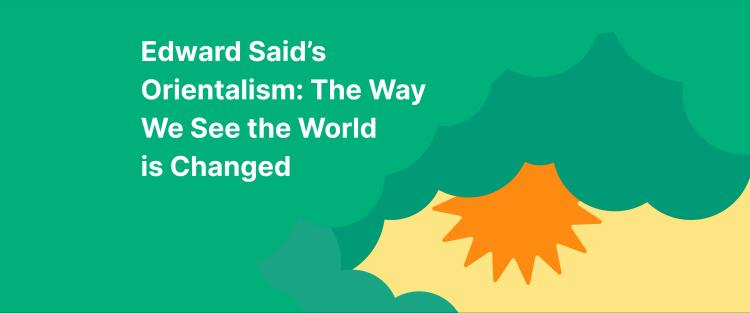Have you ever wondered why the West views the East the way it does? Edward Said's 'Orientalism' explores this question through the lens of history and imperial struggles. In this article, we will explore Said's life as a Palestinian-Americсan writer and his take on postcolonial ideas, and how they still affect our understanding of cultures.
Quick summary: What is Edward Said’s 'Orientalism?'
Edward Said’s 'Orientalism' is a foundational work in postcolonial studies that critiques how the West has historically portrayed Eastern societies as exotic, backward, and inferior. Said argues that these cultural representations are not objective but deeply tied to colonial power structures, serving to justify domination and control. By analyzing literature, academic discourse, and media, 'Orientalism' reveals how knowledge about the East was shaped by imperial interests rather than authentic understanding.
Disclaimer:
This article is intended for educational purposes and aims to present the key ideas and historical significance of Edward Said’s work, particularly his theory of Orientalism. The views and interpretations discussed reflect Said’s own perspectives and contributions to academic discourse. They do not represent the political stance of Headway. Our goal is to foster critical thinking and cultural understanding by exploring influential thinkers and their impact on global conversations.
How Edward Said's 'Orientalism' challenged the way the West "understands" the East
Edward Said was an incredible thinker and a powerful voice in today's changing landscape of the West and the East's critical-cultural dialogue. Born in Jerusalem in 1935, his life story is closely intertwined with the historical struggles of the Middle East.
His dual Palestinian-American identity has enriched the art of literary criticism by blending it with political philosophy, refining the general "cultural representation" vision. His key work 'Orientalism,' published in 1978, turned literary theory, cultural criticism, and Middle Eastern studies on their heads.
"Every single empire in its official discourse has said that it is not like all the others, that its circumstances are special, that it has a mission to enlighten, civilize, bring order and democracy, and that it uses force only as a last resort."
As someone who initiated postcolonial studies, Said challenged traditional academia, urging professors and students to rethink their approaches to debates on power and knowledge. What truly sets Said apart is how he took his ideas beyond the classroom walls.
He passionately advocated for Palestinian rights and used his influence to advocate for Palestinian rights throughout his life. The way he combined profound academic work with heartfelt activism made his contributions compelling and encouraged many to revisit their perception of world politics and relationships between nations.
"The more one is able to leave one's cultural home, the more easily is one able to judge it, and the whole world as well, with the spiritual detachment and generosity necessary for true vision. The more easily, too, does one assess oneself and alien cultures…"
'Orientalism' questioned the classic lens through which the West viewed the East, pointing out that these views come from old power imbalances nurturing imperial control patterns. The impact of this writing redirected conversations about race, imperialism, and how the rest of the world sees the Arab and Muslim communities.
By pushing readers to question the status quo, 'Orientalism' has become a key conversation starter about power dynamics, representation, and the lasting effects of colonialism.
Edward Said's early life, education, and influences

Some accounts of Edward Said's early years may vary, reflecting the complexities of applying personal narrative as a historical argument and his later stance on ethnic representation. He grew up in a Palestinian Christian family that held American citizenship.
As a child, he would move back and forth between Jerusalem and Cairo, spending the hot summer breaks in Lebanon. Growing up in such a diverse environment greatly influenced his ideas and later critiques about "fixed identities."
After studying in Jerusalem and Cairo, he went on to complete his education at Princeton and Harvard, exploring the world of English literature. Edward's intellectual journey was greatly influenced by remarkable figures like Joseph Conrad, who studied themes of imperialism that mirrored his own life experiences.
He also drew inspiration from thinkers like Giambattista Vico (the idea that "the human world is made by humans and therefore can be understood by humans"), Michel Foucault (the idea of "discourse as systems of thought, practices, and institutions"), and Antonio Gramsci (the Marxist philosophy of "dominant group and subordinate class consent").
The Palestinian displacement following the establishment of Israel in 1948 deepened his understanding of how the West perceives the East. In his memoir, 'Out of Place,' Said shares his journey of navigating a web of cultures and political landscapes.
His time in Massachusetts at Northfield Mount Hermon School made him see diversity as a defining factor in decoding a person's race and identity.
Major career milestones and academic achievements
Edward W. Said's academic adventure took flight at Columbia University, where he joined the faculty in 1963 and stayed until his passing in 2003. As a Professor of English and Comparative Literature, he carved out a prominent spot for himself in literary and cultural studies.
Not stopping there, he brought his expertise to Harvard and Yale, making a lasting impact on countless scholars and students. Keeping his hand in the political scene, he continued working as a Palestine National Council (PNC) member between 1977 and 1991, using his voice to foster understanding and bridge cultural gaps.
One of his proudest achievements was co-founding the West-Eastern Divan Orchestra with the brilliant Daniel Barenboim, an Argentine-Israeli pianist and conductor. Together, they united young Arab and Jewish musicians, showcasing the power of collaboration and harmony.
In addition to lectures and papers, Said used his four decades at Columbia to inspire countless minds and spread his groundbreaking ideas far and wide. His role in the PNC and the Orchestra highlighted his unwavering commitment to advocating for the Palestinian people and promoting cultural dialogue to narrow political divides.
Edward W. Said's career embodied the spirit of engagement. He transformed his theories into actions and embraced the complex realities of the Middle East. He was, without a doubt, one of the most devoted champions of the Palestinian cause.
Key themes and images in Said's 'Orientalism'
In general, 'Orientalism' offers an in-depth critique of a long-standing Western mindset that paints the East as totally different and often "inferior." Edward Said isn't just throwing out academic theories here; he's spotlighting how this way of thinking is deeply tied to the history of imperialism.
Said suggests that the West has created a specific image of "the Orient" and Islam as political concepts — "... whatever works to justify domination and control."
"The Orient and Islam have a kind of extrareal, phenomenologically reduced status that puts them out of reach of everyone except the Western expert. From the beginning of Western speculation about the Orient, the one thing the Orient could not do was to represent itself. Evidence of the Orient was credible only after it had passed through and been made firm by the refining fire of the Orientalist's work."
Using Michel Foucault's idea of discourse, Said examines how knowledge about the East is shared through various Western writings, from novels to scholarly articles to travelogues. This examination is crucial to understanding the connections between modern politics and the dreams of the old empires to expand again.
The "Orient" concept: A key to staying objective in West vs East conflicts
The terms "Orient" and "Oriental countries" traditionally refer to the regions situated in and strongly associated with the East, particularly East Asia, as opposed to the Western European space.
 Said argues that the "Orient" isn't just a geographical location or a collection of cultures; it's more like an imaginative idea designed by the West. This concept often sets up a clash of binaries — like rational vs. irrational and civilized vs. barbaric — which helps to define the East in opposition to the West.
Said argues that the "Orient" isn't just a geographical location or a collection of cultures; it's more like an imaginative idea designed by the West. This concept often sets up a clash of binaries — like rational vs. irrational and civilized vs. barbaric — which helps to define the East in opposition to the West.
"In a sense the limitations of Orientalism are, as I said earlier, the limitations that follow upon disregarding, essentializing, denuding the humanity of another culture, people, or geographical region."
Said suggests that this has given grounds for stereotypes like Arabs and Muslims being cast as "exotic and dangerous" in Western news, art, and science.
Said argued that these ‘Orientalist narratives’ reinforced what he saw as the West’s imperialist authority over the East. But here's the kicker: Said highlights that "the idea of the Orient isn't solid but is easily rewritten by the Western leaders to legitimize their imperial goals."
According to Said, this process combined diverse Eastern cultures under a homogenized narrative, portraying them as static and in need of Western intervention.
"Orientalism" shaking the world: How Said's critique ignited an ongoing public debate
When 'Orientalism' first saw the world in 1978, it set off a whirlwind of discussions among scholars and the public. Reactions were varied — some absolutely loved its bold ideas, while others raised their eyebrows at its methods and conclusions.
Many Middle Eastern studies experts expressed concerns about Said's sweeping generalizations and his focus on English and French perspectives, which they felt might miss the rich diversity in other European and American scholarship.
"Now because Britain, France, and recently the United States are imperial powers, their political societies impart to their civil societies a sense of urgency, a direct political infusion as it were, where and whenever matters pertaining to their imperial interests abroad are concerned."
Some critics argued that he oversimplified the West and didn't fully address the resistance within non-Western societies. The originality of his ideas was questioned because earlier Arab thinkers had touched on similar themes.
Despite the back-and-forth, there's no denying that Said's work started a massive shift in how we look at the Middle East and the broader East, placing Western scholars' objectivity under the microscope.
"Modern Orientalism embodies a systematic discipline of accumulation. Far from this being exclusively an intellectual or theoretical feature, it made Orientalism tend fatally towards the systematic accumulation of human beings and territories…"
Said’s most pointed critiques targeted Bernard Lewis, a leading British-American historian studying the region, whom he claimed downplayed the distinct history of the Orient in global academic discussions about the Middle East.
This debate made its way into The New York Times, with some commentators accusing Said of anti-Semitism due to his criticisms of Zionism (the Jewish homeland's sovereignty and national self-determination) and Israeli policies.
Most of the time, Said welcomed discussions with Jewish intellectuals. Such an open-minded approach amplified the impact of 'Orientalism' on how the public discussed cultural stereotypes.
How did 'Orientalism' reframe postcolonial social studies?
'Orientalism' has had a transformative impact on literary theory, nurturing the conversation about how power and ideology come into play. Said's insights led scholars to reexamine how the West portrays the Middle East, Asia, and North Africa, pushing many to dig deep into the assumptions and biases behind these representations.
"Always there lurks the assumption that although the Western consumer belongs to a numerical minority, he is entitled either to own or to expend (or both) the majority of the world resources. Why? Because he, unlike the Oriental, is a true human being."
This work has inspired a great deal of further research into the ties between colonialism and imperialism and how we build and change our cultural and national identities over time.
 The lasting impact of 'Orientalism' is about raising our awareness of the political weight of cultural symbology. This is a huge step in understanding the complex connections between culture and politics, especially in our increasingly globalized world.
The lasting impact of 'Orientalism' is about raising our awareness of the political weight of cultural symbology. This is a huge step in understanding the complex connections between culture and politics, especially in our increasingly globalized world.
Said's 'Orientalism' and today’s ongoing conflicts
Edward Said's 'Orientalism' remains as relevant today as it was decades ago. His thoughts on what determines "the Middle East and Islam" discourse in the Western media, especially when it comes to conflict and war, have not lost their value.
The ongoing war between Israel and Hamas serves as a powerful reminder of how history continues to shape the world and humanism in the twenty-first century:
"Most important, humanism is the only, and I would go so far as to say, the final resistance we have against the inhuman practices and injustices that disfigure human history."
Said highlights how colonialism still affects today's struggle to save lives while fighting for your cause and how narratives influence our understanding of these complex issues. The author talks about "Zionism" in detail, and he equates the importance of preserving the Holocaust legacy with the need to revise "the Orientalist views" of the Islamic East:
"We allow justly that the Holocaust has permanently altered the consciousness of our time: Why do we not accord the same epistemological mutation in what imperialism has done, and what Orientalism continues to do?"
Said's ideas help to explain neo-imperialism and its ongoing colonial aftereffects around the globe, including the "us" versus "them" mentality, often based on culture or religion. Said's concept of states colonized by European powers pushed Noam Chomsky to debate American foreign policies in particular, and their impact on the Middle East.
How Said's ideas still resonate in modern peace discourse
Edward Said’s critiques remain relevant today, particularly in how media and policymakers frame conflicts in the Middle East. His analysis of Orientalism offers insight into how longstanding cultural narratives can shape international responses to war and diplomacy.
In 'The Politics of Dispossession,' Said examined events like the Gulf War and the 1994 Washington Declaration, highlighting how regional politics and international intervention are often intertwined with deeper historical perceptions.
He extended this critique in 'The End of the Peace Process: Oslo and After,' where he raised concerns about representation, equity, and the challenges of negotiating lasting peace. Said’s work doesn’t shy away from difficult questions — he scrutinized both international powers and Palestinian leadership to advocate for a more just and inclusive peace process.
His book 'The Question of Palestine' offers a broader exploration of national identity and self-determination, situating these issues in a global context that still shapes today’s debates.
Learn more about Said's 'Orientalism' and West-East history with Headway
Edward Said's 'Orientalism' remains indispensable for understanding the intricate power dynamics that shape cultural representations. After Said died in 2003 following a long fight with leukemia, his work as a writer-humanist continued to prompt thousands to foster a more equitable world.
Beyond its focus on the Middle East, 'Orientalism' offers a broader framework for examining dominant cultures' constructs and how they represent marginalized groups, reinforcing power imbalances. Said specifically cites Napoleon's invasion of Egypt in 1798 as the start of Western powers' systematic influence.
His commentary on the role of intellectuals as critical voices remains a vital call to action, urging us to question prevailing narratives regarding the dynamics of the Middle East, America, and Europe.
To take a step further into the nuanced arguments and rich details of 'Orientalism,' as well as the history and politics of the Middle East versus the West, we encourage you to team up with the Headway app for a comprehensive exploration of this foundational text in cultural criticism and postcolonialism.
One of the best ways to start is by checking our reading list, "60 Best History Books," carefully curated by our team of history enthusiasts. Our top pick on the list is 'On Tyranny' by Timothy Snyder.
Frequently Asked Questions About Edward Said
Who is Edward Said?
Edward Said was a remarkable cultural critic, literary theorist, and passionate advocate for Palestinian rights, whose life intersected with significant historical moments.
What are the key dates of Edward Said's life?
1935: Born in Jerusalem, his culturally rich upbringing influenced his work.
1957: Graduated from Princeton, where he began to develop his influential ideas.
1963: Joined Columbia University, becoming a key figure in literary and cultural studies.
1978: Published 'Orientalism,' which examined Western perceptions of the East and highlighted imperialist narratives, solidifying his status in postcolonial studies.
1977-1991: Actively involved in the Palestine National Council, advocating for Palestinian rights.
1999: Co-founded the West-Eastern Divan Orchestra with conductor Daniel Barenboim to promote understanding through music.
2003: Passed away in New York due to leukemia, leaving a lasting legacy as a critic of cultural imperialism and an advocate for justice.
What books did Edward Said write?
In addition to 'Orientalism' (1978), 'The Question of Palestine' (1979), 'The Politics of Dispossession: The Struggle for Palestinian Self-Determination, 1969-1994 ' (1994), 'Out of Place: A Memoir' (1999), E. Said also published:
1966: 'Joseph Conrad and the Fiction of Autobiography'
1975: ’Beginnings: Intention and Method'
1981: 'Covering Islam: How the Media and the Experts Determine How We See the Rest of the World'
1983: 'The World, the Text, and the Critic'
1986: 'After the Last Sky: Palestinian Lives' (with photographs by Jean Mohr)
1988: 'Nationalism, Colonialism, and Literature'
1991: 'Musical Elaborations'
1993: 'Culture and Imperialism'
1994: 'Representations of the Intellectual: The 1993 Reith Lectures'
1995: 'Peace and Its Discontents: Essays on Palestine in the Middle East Peace Process'
2000: 'Reflections on Exile and Other Essays'
2000: 'The End of the Peace Process: Oslo and After'
2001: 'Power, Politics, and Culture: Interviews with Edward W. Said' (edited by Gauri Viswanathan)
2002: 'Parallels and Paradoxes: Explorations in Music and Society' (with Daniel Barenboim)
2003: 'Freud and the Non-European'
2004: 'Humanism and Democratic Criticism'
2004: 'From Oslo to Iraq and the Road Map'
2006: 'On Late Style: Music and Literature Against the Grain'
What is Edward Said's most famous work?
'Orientalism' (1978). Said's concept of "Orientalism" suggests that the Western study of Eastern cultures, particularly in the Middle East, is not neutral but rather influenced by the history of Western imperialism and colonization. The portrayal of Eastern cultures reflects the West's power dynamics over these regions.
Did Edward Said have a daughter?
Yes, Najla Said is Said's daughter.
What is a famous quote by Edward Said?
Edward Said is known for sharing many thought-provoking ideas. One of his most well-known quotes is:
"The Orient was almost a European invention, and had been since antiquity a place of romance, exotic beings, haunting memories and landscapes, remarkable experiences."
This quote from 'Orientalism' sums up his central idea: for a long time, the West has been painting an imaginative but often incorrect picture of the Eastern world.













